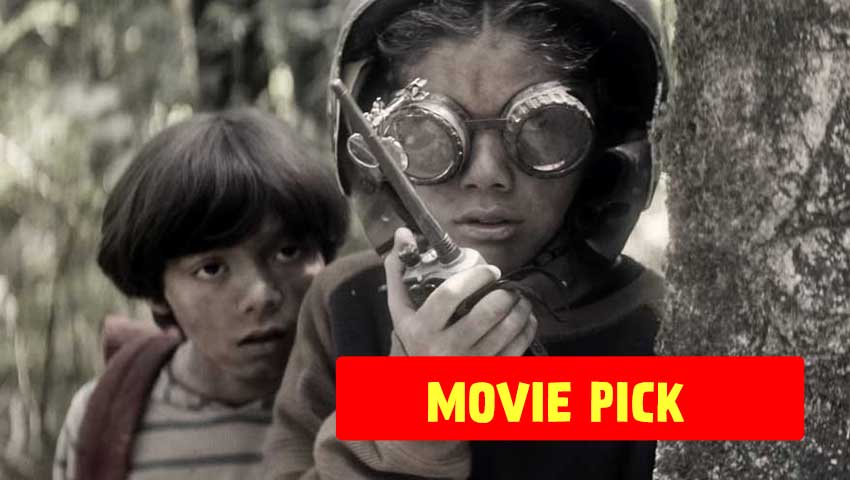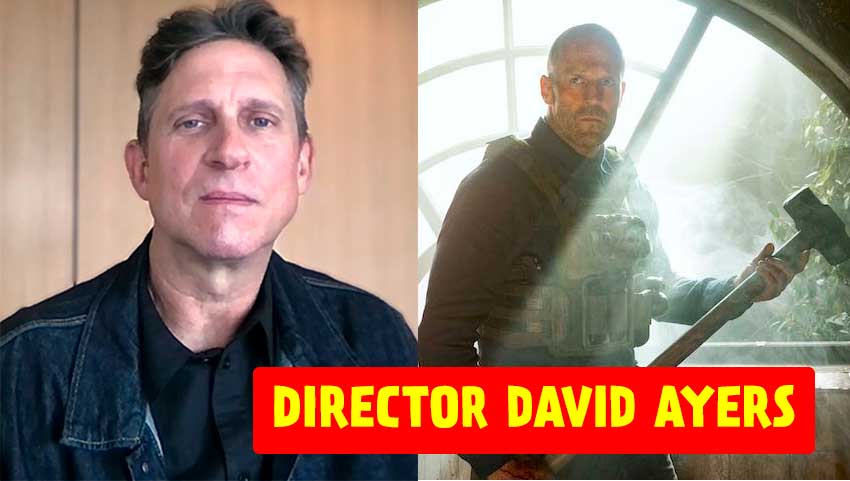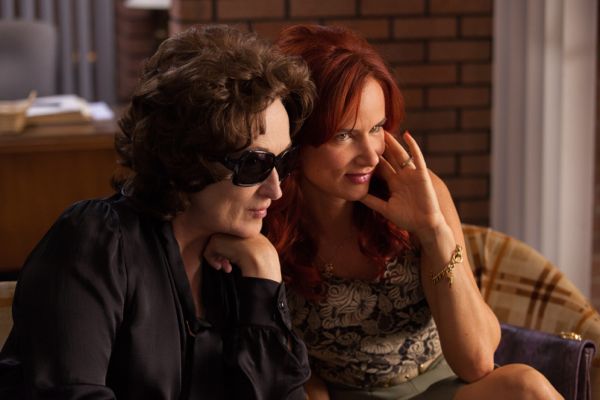Julia Roberts, Meryl Streep and 'August:Osage County' Cast Interview: How To Play A Dysfunctional Family
- Details
- Last Updated: Friday, 20 December 2013 18:41
- Written by Lupe R Haas
AUGUST: OSAGE COUNTY director John Wells, Julia Roberts, Meryl Streep, Dermot Mulroney, Margo Martindale, Julianne Nicholson, Juliette Lewis, Chris Cooper and Abigail Breslin were in New York City promoting their drama and their preparation in playing the dysfunctional Weston family on screen and having the original material by Tracy Letts to rely on.
Q: What was it like adapting the claustrophobic feeling of the play in film?
John Wells: I’m from the plains outside Denver Colorado and we found this beautiful home repurposed homes in Osage County in Oklahoma and we found it’s actually quite claustrophobic to be in these small homes in these vast landscapes. So what we were trying to do was create that same sense of having this very claustrophobic place where everyone is stuck and a long way away from everyone else and match the claustrophobia in the home.Q: Tracy, what conversations did you have with John about what stays and what goes?
Trace Letts: We try not to begin the conversation about what we have to lose or cut, we try to have a more general conversation about how we tell the story and where will pictures substitute words without losing all the things that made August Osage County August Osage County to begin with. A lot of the language and the humor. So we try to find a visual language, a visual flow, a dynamism to the piece. A cinematic version of the story. Then you get to the point where you are doing some painful cutting, losing some material, but that’s the process.
Q: Where there scenes you held onto til the very end or shot that didn’t make it?
Tracy: Sure, and there always are in any film. Those are some painful decisions you’re making… There were some specific things I hated to lose, but the truth is the play exists as a play and always will and the movie is its own very distinct, self-contained, and successful story in its own right.
Q: Chris, we know what it’s like to watch Meryl act as an actor, what’s it like to watch her as an actor?
Meryl: He’s the only one I’ve done a nude scene with.
Chris Cooper: We do our best. I keep having this fantasy… this is the setting where you talk about the whole process, like on Charlie Rose, to say that the viewer that watches her work still has no idea that the talent we observe, per take, because she brings such variety. With this character she’ll bring out, of course the drug addled side, but she doesn’t give a shit about the situation and shows this mean underbelly in the conversation and we never know what’s coming. This is the second time I’ve worked with her and I’m still learning.
Q: Julia, before the family can become dysfunctional they have to be functional. Was there anything you actors did to prepare?
Julia: We spent a lot of time together, getting to know each other… By the time we began filming I felt very familiar and entangled with these girls in a way that felt correct for sisters and had made just enough happy experiences with them and had a couple of appropriate sisterly ‘really, that’s what you’re wearing?’ kind of moments
Q: Margo, was there a compound or something you all lived together on before you started filming?
Margo Martindale: We did a lot of socializing together; we actually became a family together, watched television together, cooked together, ate together, laughed, worried about hurricane Sandy together. It made for the perfect environment for these ensemble actors to do this beautiful screenplay.
Q: Did you make a casserole?
Margo: I actually made a chicken and spaghetti casserole.
Q: Julianne, what’s the language of this film? The stage has its own style of acting, what about film? What were the conversations with John like?
Julianne Nicholson: I do approach it differently. In terms of theater you have to fill the space in a different way, but in approaching it you just want to honor the words and the presence of the people around you, which really ups your game tremendously. Tracy’s writing is very particular and beautiful and has a rhythm to it, so there was no improvising because we didn’t want to mess with that rhythm. It feels and sounds very naturalistic but it’s quite exciting. There’s freedom when you know you can’t stray from the lines.
Q: Meryl, did you have a conversation about Violet’s motivation with John and Tracy? It’s a character that can be played so many different ways.
Meryl: John and I emailed each other a little bit in preparation for this and I would say one of the things that really interested me was where she was at any point in the cycle of pain and pain relief. Where she was on her pain killer cycle in any given scene. We had to map that in a way just so I’d know what level of attention or in-attention to bring to my fellow actors. As an actor you’re supposed to want to know if it’s a house of pain. It’s not really something that’s fun and I resisted doing this initially, the part, because of that. It was just ugh. On so many levels, physically, mentally, spiritually, emotionally, Violet is enraged or in pain or drunk at any given time. I didn’t doubt that I could figure out how much I could keep.
Q: Abigail, you play somebody getting the worst of it. What was your interest in playing Jean?
Abigail Breslin: When I read it I really immediately felt attached to her for some reason. I was 14 not that long ago, so I kinda know that age is a really weird age because you’re not really a kid, but you’re not really accepted as being a teenager yet, so it’s complicated. She does have a lot going on because she’s trying to act like she doesn’t even care and say she doesn’t want to be here like she’s tough, but she’s not at all. Towards the end is when she’s realizing ‘oh my god I don’t want to become like any of these people at all.’ So there’s a little bit of hope for her.
Q: Juliette, your character says she’s not proud of the things she knows about. What about you as an actor? How do you figure that out about your charcter?
Juliette Lewis: That would be more of an intellectual approach. I guess some people write diaries or back stories. When I first read this script I immediately understood. My heart just swelled and I understood everything about Karen and so what one is not proud of is all relative. What she’s not proud of could be nothing to somebody else. People’s pain is so individual but I feel like as an actor to be in touch with all those emotions of shame, anger, your lust, your joy, it’s sorta like your watercolors. I have to validate Tracy and John while they’re here because, first of all, John gave us this beautiful environment to pour out what we needed to create these roles. He was always very consistent as a temperament, like really lovely and easy to work with and perform. He gave us a rehearsal period, which is really a luxury on film these days. And then Tracy Letts, his writing, I was just floored, because you’ve seen the state of cinema today. This is something that only comes once in a while. The characters her denial and all these things. I’m always struggling between being a realist or an idealist. Some people say you can be both, but it depends.
Q: Dermot Mulroney, your creepy guy, no offense, takes a phone call during a dinner scene and the filming goes on for four day. What was it like?
Dermot Mulroney: Those four days were the most memorable I’ve had in my 28 years of film acting, no offense, Julia. You can see why. This is a famous scene and this character I was truly gifted with, and John, thank you so much to be here with all of you today, I’m almost choking up with the privilege and honor I feel. To tell you about that scene would be to tell you how you’re supposed to make movies. That’s how it’s supposed to be done. You’re supposed to do it straight through with everybody there. You’re supposed to do it in a real place in a day in a real town, so all that was provided with us along with words that will stand for centuries. Now that we’ve filmed it, can you imagine people long afterwards that will be enjoying Tracy’s words. I felt all of that going in. Just as your stepping into the house you leave it on the porch. My character’s happy go lucky, answering the phone with his... fourth wife. And then we have that scene where I know but nobody else does. You have glimpses in that scene being revealed to Steve about what he actually walked into and how he’s going to deal with it. And in terms of the story he doesn’t deal with it very well and makes impossible choices. Or however you read that, he wasn’t able to suppress his urges. Whole courses in college are devoted to that. I was thrilled to have one of the ugly people in this play.
Q: Juliette, Julian, and Julia, this is about family breaking up. How do you deal with that? What are you doing now, what’s in your future?
Julia: I’m going to Disneyland. I don’t want to say where I’m going because I think more than any person in the piece, Barbara, in the end, everyone I’ve spoken to says ‘they know exactly what she’s thinking and where she’s going’ and I haven’t heard the same answer twice. I don’t want to spoil it for anybody.
Q: What about Ivy?
Julianne Nicholson: I don’t know where she’s going, she’s driving away. She’s leaving and maybe she’s figuring it out tomorrow.
Q: Juliette?
Juliette: Now I’m thinking about the last question you said. What she felt bad about. Where she’s going? Karren represents so many different people in life, women and people I’ve met. She can go one of two ways. They’ll fight on the trip, no doubt. He’ll hit on the waitress and might buy her a present. Then they might fall back into it. She might have an epiphany. She’s not going to have an epiphany. I think she would. She could.
Q: We’ll hand the questions to the audiences. What surprises did you have with relating it to characters.
Julia: I was surprised by people every day. Just seeing Violet for the first time chilled me to the core, I had no idea. Just when she walks into the room. You never knew what was going to happen when. It was a thrill every day to see this amazing cast. How honest and true and how great it was.
Q: What was like working with a large ensemble cast?
Julia: The thing about this piece is that I wish Ewan and Benedict were here because we were all part of things working or not. Parts are singled out. Chris’ character, I felt, was imbued with his enormous brevity and compassion and I knew the audience would love him. And I knew they paid me. And that is the story. It’s balance. It’s balance of all these characters that you’re aware of watching the play that you turn your eyes from one to the other, but with each person you get what you give and you give what you get and it only works if you’re together. This one [I don’t know who she’s referring to] said she had my back and I always felt that way about her. You’re lucky to have each other. That does have to do with how John get things up. You don’t get to vote who’s in your family, but John is like a god. With Dermot, Dermot and I have been friends since after his wedding and when he called me about getting the part we squealed like little girls. We were so excited for each other and being back together. The whole time I felt so supported by my old friends. It was beautiful to have each other in that way, especially when we were all away from our families and forging new relationships. It was good to have my rocksteady here.
Dermot: I’d start my day with coffee and Julia. We’d whisper into each other ears on the set and kiss each other good night.
Q: How did Meryl and Julia get into the mother-daughter bond and how did you shake it off.
Meryl: We ate a lot.
Julia: We learned a lot. I let her look me right in the eye to make sure we were good before we parted ways.
Meryl: It wasn’t the most joyous experience from my point of view. It was hard to feel that way about everybody. Except you. That was miserable. It was also during the election also television is very odd down there. You can feel very disembodied in that world, so it’s important to make a connection outside the set. Also, I was smoking non stop, which really makes you feel shittier.
Q: This is for everyone. The movie touches on so much, was there a topic that touched you emotionally?
Chris: I had to particularly zero in on this idea of unconditional love for your child when people don’t see that child as whole. So something was really visceral. Some life experience that you can bring to your work.
Margo: I found the part of being so critical and painfully brutal to my son to be the hardest thing. I could see a little of that in myself and it made me feel ashamed. That was the hardest part for me, is how incredibly cruel I was.
Julia: One of the most upsetting scenes we shot early on was with Sam Shepard, a writer and actor I admire, was to look at him close up and see his loathing of me. That was really hard because you get old, you look old. You’re old. And you still thing maybe there’s a spark of love from this person who has gone through everything. And looking in his eyes and realizing he’d rather be dead than looking at me, that was brutal. That set the tone for my dealing with his death and afterwards.
Q: How does this weighty role fit into everything done? This is so heavy.
Tracy: It’s very important to us that we try to preserve the humor of the piece. I always felt the secret of the success of August Osage County was the humor. Often the humor is lost going from plays to film, like in Glengarry Glenn Ross. The movies become a gloomier affair and they lose a lot of the humor. I said to John if this happens to August we’re dead. We’re talking about the pain these characters are going through and it’s very real and true, that’s what the piece is about.
While it may be difficult for the actors to live in, it would be impossible for the audience to watch if it wasn’t for the humor. The humor is what hooks you in. As long as you’re laughing you’re listening. We didn’t talk about it in terMeryl of the laughs, but we talked about maintaining a certain buoyancy and rhythm that would allow for audiences to laugh. I’ve seen now a couple of times with large audiences it works, so I’m happy about that.
John: That was a big fear when we first started to screen the film, would anybody laugh. The tremendous relief when they start to is great. Our producer gave us access to a video version of the play and sat there with a highlighter highlighting every part in the play where people laugh. In the cutting of our piece we only cut two parts that had laughs and saved every single laugh for that reason. The humor is what allows the characters to crisis. This is how my family undermined attention by saying something sorta funny and then they laugh and try to think of something funny to get them back.
Meryl: Every character I’ve ever played is five six and weighs the same, as far as “weightiness” goes. I tried to look thinner and sicker than I actually am. I don’t think about things that way. ...The humor is born out of pain, and yeah, you do want the laughs. All these actors came to rehearsal with the play in their minds, especially the laughs.
AUGUST: OSAGE COUNTY opens in limited theaters Christmas Day and expands to more theaters January 10, 2014.







